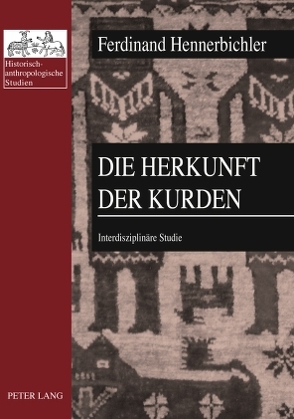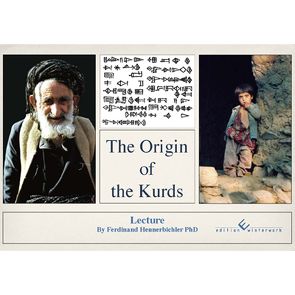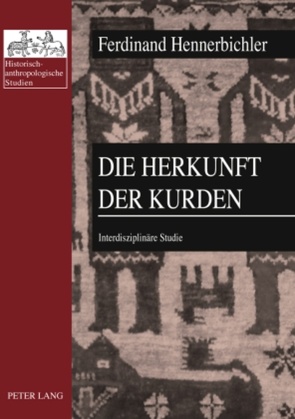
Mit der Arbeit wird in Form einer integrativen geschichtswissenschaftlichen Darstellung erstmals eine interdisziplinäre Studie vorgelegt, in der versucht wird, den Stand der Forschung über die Herkunft der Kurden durch Erkenntnisse der Evolutionären Anthropologie, Genforschung, Archäologie, einer ältesten, verfügbaren Terminologie, vergleichender Sprachwissenschaften und der Historiographie zusammenzufassen und daraus neue Erkenntnisse zu gewinnen. Das Ergebnis legt eine Neubewertung der Herkunft der Kurden nahe. Entgegen der bisher vorherrschenden Lehrmeinung, Kurden wären Iranier und stammten aus Gebieten des heutigen Irans, hauptsächlich deshalb, weil sie (heute) Iranisch sprechen, kommt die interdisziplinäre Studie zum Schluss, dass (heute noch lebende) Kurden in erster Linie Nachkommen einer neolithischen, multiethno-kulturellen Urbevölkerung in ihren angestammten Lebensräumen zwischen Ost-Anatolien, Nord-Mesopotamien und des Zagros einschließlich seiner Ostausläufer (aber sonst großteils außerhalb des heutigen Irans) sein dürften. Führende Populationsgenetiker der Gegenwart charakterisieren Kurden als engste genetische Verwandte von Juden (und Armeniern). Die älteste sprachliche Iranisierung der Kurden könnte noch vor der Zeit der Achaemeniden und möglicherweise auch der Meder aus Gebieten des heutigen Nordwest-Irans anzusetzen sein (Gernot Windfuhr, Ann Arbor). Demnach dürften Kurden als selbständiges Volk mit eigenständiger Herkunft und Geschichte ihres angestammten Lebensraumes zu begreifen sein, die erst im Laufe des ersten Jahrtausends sprachlich iranisiert wurden. Sie repräsentieren damit eines der ältesten Zivilisationsvölker des Nahen Ostens und Vorderasiens.
Aktualisiert: 2020-09-01
> findR *

First interdisciplinary study composed by the Austrian Historian Ferdinand Hennerbichler (*1946), backed up by leading Iranist Gernot L. Windfuhr, Ann Arbor, Michigan, USA, and renowned DNA Genealogist Anatole A. Klyosov, Newton, Massachusetts, USA, concluding: forefathers of Kurds were for the most part ethnically made up of Neolithic aboriginal Northern Fertile Crescent peoples and of Indoiranian speaking emigrating elites from Central Asia. According to recent research of Palaeo/Archaeo-genetics and DNA Genealogy, forefathers of Kurds were in their earliest traceable origins mainly descendants of Near Eastern and Eurasian indigenous aboriginal peoples, predominantly oldest Neolithic farmers and shepherds who cultivated areas of the Northern Fertile Crescent ca. 10,000-5,000 B.C.E. During the last millennia B.C.E. these aboriginal Neolithic forefathers of Kurds were linguistically Indoiranianized by emigrating militarily organized elites from Central Asia in two waves: between 2,200/2,000-1,600 B.C.E., via the Russian plains into Eastern Anatolia, Northern Mesopotamia and Zagros mountain regions, and ca. 800-600 B.C.E., mainly via the Iranian Plateau into Northwest Iran of today (Anatole Klyosov). This waves of migrations contributed to multi-ethno-cultural societies of Northern Fertile Crescent aboriginal forefathers of Kurds and of militarily organized elites who came from central Asia and who obviously imposed Old-Iranian on the indigenous populations from territories of the Northwest-Iran of today. Previously, Kurds spoke an unknown assumed Proto-Non-Iranian language. Hurritian played a dominant role in Kurdistan during ca. 1,000 500 B.C.E. (Ran Zadok). The first stages of the language of Iranianized Kurds could go back to the pre-Median or pre-Achaemenid periods (Gernot Windfuhr). An earlier influence of Old-Indo-Aryan-speakers in the ancient kingdom of Mitanni during the 2nd millennium B.C.E. is disputed. The word Kurd itself could mean mountain people, frequently complemented by various attributive expressions for war-like mountaineers. Oldest roots of the term can be traced back to the Sumerian assumed word stem kur denoting various mountain peoples and lands. In cuneiform sources kur-related terms are frequently used for mountaineers who inhabited ancestral homelands, which traditionally encompassed areas stretching from Eastern Anatolia via Northern Mesopotamia to Zagros regions and eastwards into Northwest-Iran of today. Also, since the 23rd century B.C.E. existed a steady but fragile, waxing and waning continuity of kur-stem term labels characterizing various mountain people. Some of them can be convincingly and in continuity allocated to descendants of aboriginal forefathers of Kurds. In conclusion, this new book tries to prove that Kurds are an independent autochthonous people mainly from areas outside of Iran of today. The published results triggered a lively on-going scientific discussion. Reactions so far are mostly positive.
Aktualisiert: 2023-01-01
> findR *

Mit der Arbeit wird in Form einer integrativen geschichtswissenschaftlichen Darstellung erstmals eine interdisziplinäre Studie vorgelegt, in der versucht wird, den Stand der Forschung über die Herkunft der Kurden durch Erkenntnisse der Evolutionären Anthropologie, Genforschung, Archäologie, einer ältesten, verfügbaren Terminologie, vergleichender Sprachwissenschaften und der Historiographie zusammenzufassen und daraus neue Erkenntnisse zu gewinnen. Das Ergebnis legt eine Neubewertung der Herkunft der Kurden nahe. Entgegen der bisher vorherrschenden Lehrmeinung, Kurden wären Iranier und stammten aus Gebieten des heutigen Irans, hauptsächlich deshalb, weil sie (heute) Iranisch sprechen, kommt die interdisziplinäre Studie zum Schluss, dass (heute noch lebende) Kurden in erster Linie Nachkommen einer neolithischen, multiethno-kulturellen Urbevölkerung in ihren angestammten Lebensräumen zwischen Ost-Anatolien, Nord-Mesopotamien und des Zagros einschließlich seiner Ostausläufer (aber sonst großteils außerhalb des heutigen Irans) sein dürften. Führende Populationsgenetiker der Gegenwart charakterisieren Kurden als engste genetische Verwandte von Juden (und Armeniern). Die älteste sprachliche Iranisierung der Kurden könnte noch vor der Zeit der Achaemeniden und möglicherweise auch der Meder aus Gebieten des heutigen Nordwest-Irans anzusetzen sein (Gernot Windfuhr, Ann Arbor). Demnach dürften Kurden als selbständiges Volk mit eigenständiger Herkunft und Geschichte ihres angestammten Lebensraumes zu begreifen sein, die erst im Laufe des ersten Jahrtausends sprachlich iranisiert wurden. Sie repräsentieren damit eines der ältesten Zivilisationsvölker des Nahen Ostens und Vorderasiens.
Aktualisiert: 2023-04-08
> findR *
MEHR ANZEIGEN
Bücher von Hennerbichler, Ferdinand
Sie suchen ein Buch oder Publikation vonHennerbichler, Ferdinand ? Bei Buch findr finden Sie alle Bücher Hennerbichler, Ferdinand.
Entdecken Sie neue Bücher oder Klassiker für Sie selbst oder zum Verschenken. Buch findr hat zahlreiche Bücher
von Hennerbichler, Ferdinand im Sortiment. Nehmen Sie sich Zeit zum Stöbern und finden Sie das passende Buch oder die
Publiketion für Ihr Lesevergnügen oder Ihr Interessensgebiet. Stöbern Sie durch unser Angebot und finden Sie aus
unserer großen Auswahl das Buch, das Ihnen zusagt. Bei Buch findr finden Sie Romane, Ratgeber, wissenschaftliche und
populärwissenschaftliche Bücher uvm. Bestellen Sie Ihr Buch zu Ihrem Thema einfach online und lassen Sie es sich
bequem nach Hause schicken. Wir wünschen Ihnen schöne und entspannte Lesemomente mit Ihrem Buch
von Hennerbichler, Ferdinand .
Hennerbichler, Ferdinand - Große Auswahl an Publikationen bei Buch findr
Bei uns finden Sie Bücher aller beliebter Autoren, Neuerscheinungen, Bestseller genauso wie alte Schätze. Bücher
von Hennerbichler, Ferdinand die Ihre Fantasie anregen und Bücher, die Sie weiterbilden und Ihnen wissenschaftliche Fakten
vermitteln. Ganz nach Ihrem Geschmack ist das passende Buch für Sie dabei. Finden Sie eine große Auswahl Bücher
verschiedenster Genres, Verlage, Schlagworte Genre bei Buchfindr:
Unser Repertoire umfasst Bücher von
- Hennerfeind, Barbara
- Hennerfeind, Peter
- Hennerici, Alfred
- Hennerici, Francis
- Hennerici, Martin
- Hennerici, Michael
- Hennerici, Michael G.
- Hennerkes, B.-H.
- Hennerkes, Brun H
- Hennerkes, Brun-Hagen
Sie haben viele Möglichkeiten bei Buch findr die passenden Bücher für Ihr Lesevergnügen zu entdecken. Nutzen Sie
unsere Suchfunktionen, um zu stöbern und für Sie interessante Bücher in den unterschiedlichen Genres und Kategorien
zu finden. Neben Büchern von Hennerbichler, Ferdinand und Büchern aus verschiedenen Kategorien finden Sie schnell und
einfach auch eine Auflistung thematisch passender Publikationen. Probieren Sie es aus, legen Sie jetzt los! Ihrem
Lesevergnügen steht nichts im Wege. Nutzen Sie die Vorteile Ihre Bücher online zu kaufen und bekommen Sie die
bestellten Bücher schnell und bequem zugestellt. Nehmen Sie sich die Zeit, online die Bücher Ihrer Wahl anzulesen,
Buchempfehlungen und Rezensionen zu studieren, Informationen zu Autoren zu lesen. Viel Spaß beim Lesen wünscht Ihnen
das Team von Buchfindr.


